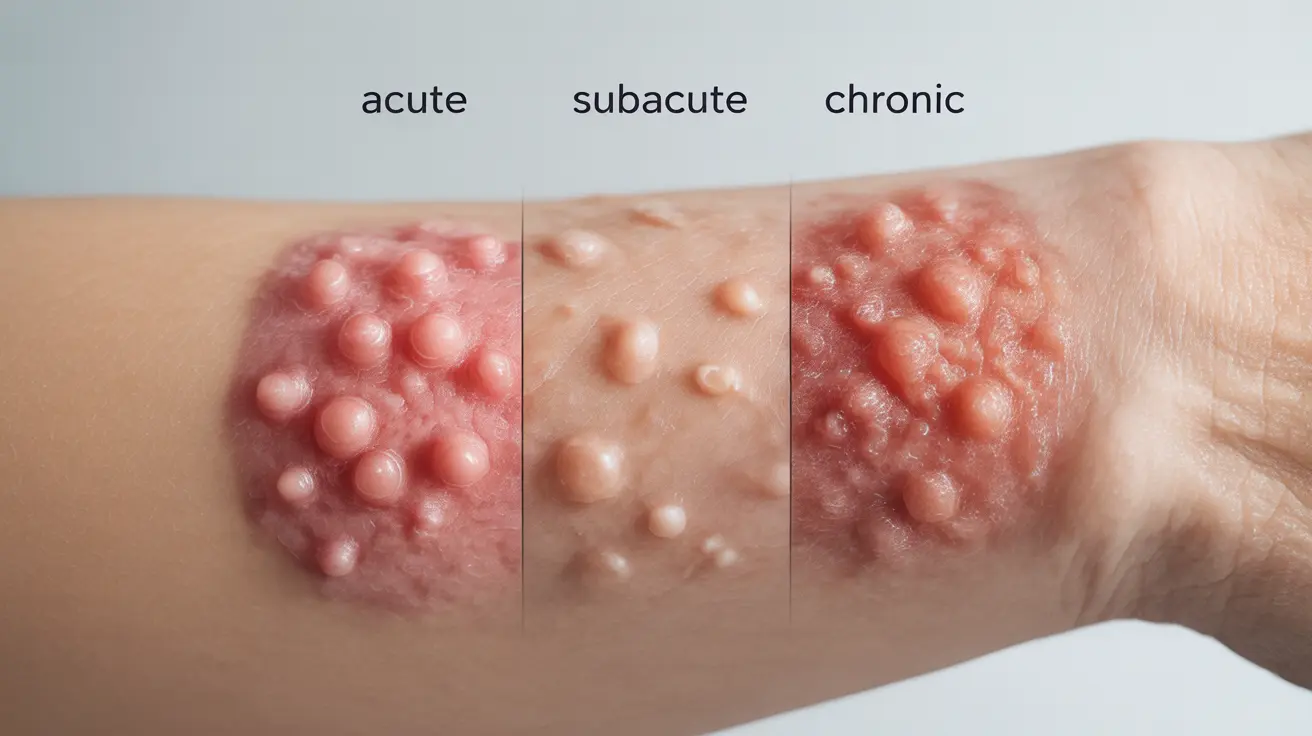Eczema, also known as atopic dermatitis, progresses through distinct stages that can significantly impact a person's quality of life. Understanding these stages of eczema is crucial for effective treatment and management of this chronic skin condition. This comprehensive guide will help you recognize the different phases of eczema and learn how to address each stage appropriately.
The Three Main Stages of Eczema
Eczema typically manifests in three primary stages, each with its own characteristic symptoms and treatment needs. Recognizing these stages can help you better manage your condition and seek appropriate care when necessary.
Acute Stage
The acute stage represents the initial flare-up phase of eczema, characterized by intense symptoms that can be particularly distressing. During this stage, you may experience:
- Intense itching
- Redness and inflammation
- Fluid-filled blisters
- Oozing or weeping skin
- Warmth in the affected area
Subacute Stage
The subacute stage serves as a transitional phase between acute and chronic eczema. Common symptoms during this stage include:
- Reduced inflammation
- Dry, flaky skin
- Slight itching
- Scaling or peeling
- Less severe redness
Chronic Stage
The chronic stage develops when eczema persists over time. This stage is marked by:
- Thickened, leathery skin (lichenification)
- Deep cracks or fissures
- Persistent itching
- Darker or lighter skin patches
- Rough, scaly texture
Managing Eczema at Different Stages
Each stage of eczema requires specific treatment approaches to effectively manage symptoms and prevent progression. Understanding these management strategies is essential for maintaining healthy skin.
Acute Stage Management
During acute flare-ups, focus on reducing inflammation and providing immediate relief:
- Apply prescribed topical corticosteroids
- Use cool compresses
- Maintain gentle skincare routine
- Avoid triggers and irritants
- Consider wet wrap therapy
Subacute Stage Management
The subacute stage requires a balanced approach to healing and prevention:
- Use moisturizers regularly
- Continue prescribed medications
- Gradually reduce steroid use as directed
- Focus on skin barrier repair
- Implement trigger avoidance strategies
Chronic Stage Management
Long-term management focuses on preventing future flares and maintaining skin health:
- Follow a consistent skincare routine
- Use appropriate moisturizers daily
- Consider phototherapy if recommended
- Maintain trigger awareness
- Regular check-ups with healthcare providers
Prevention and Lifestyle Modifications
Preventing eczema flare-ups requires a comprehensive approach to skin care and lifestyle choices:
- Choose gentle, fragrance-free products
- Maintain optimal humidity levels
- Wear breathable fabrics
- Keep stress levels in check
- Follow a balanced diet
- Stay well-hydrated
Frequently Asked Questions
What are the symptoms of each stage of eczema, and how do they differ?
Each stage of eczema presents distinct symptoms. Acute stages show intense itching, redness, and possible fluid-filled blisters. Subacute stages feature dry, flaky skin with reduced inflammation. Chronic stages are characterized by thickened, leathery skin with persistent itching and possible discoloration.
How do I effectively treat and manage eczema symptoms at different stages?
Treatment varies by stage. Acute stages require anti-inflammatory treatments and immediate relief measures. Subacute stages focus on moisturizing and gentle skin care. Chronic stages need consistent maintenance care and may require specialized treatments like phototherapy or systemic medications.
What triggers eczema flare-ups, and how can I prevent them?
Common triggers include stress, certain foods, environmental allergens, harsh soaps, and extreme temperatures. Prevention involves identifying and avoiding personal triggers, maintaining good skin care practices, and keeping skin well-moisturized.
Is eczema a curable condition, or is it a chronic condition that requires ongoing management?
Eczema is a chronic condition without a permanent cure. However, it can be effectively managed through proper treatment, trigger avoidance, and consistent skin care routines. Many people experience periods of remission with appropriate management.
How long do eczema flare-ups typically last, and what influences recovery time?
Flare-up duration varies from a few days to several weeks, depending on triggers, treatment adherence, and individual factors. Recovery time can be influenced by stress levels, environmental conditions, prompt treatment initiation, and the effectiveness of management strategies.




